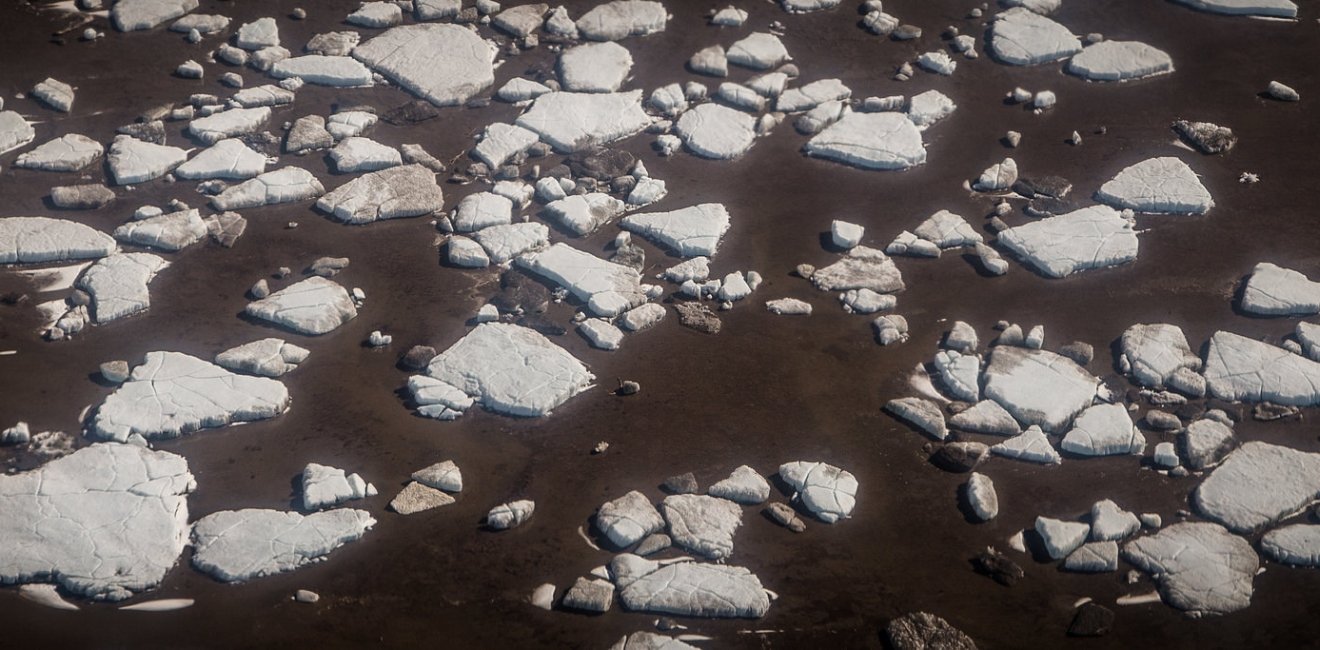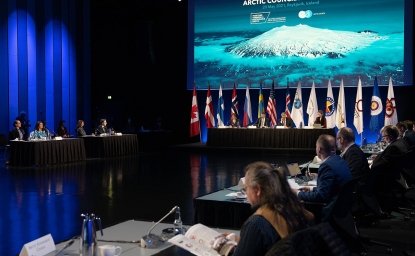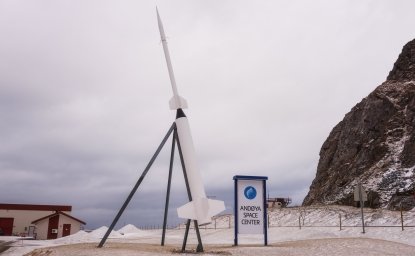This interview originally appeared in the Yale Journal of International Affairs (online, September 15, 2015).
An Interview with David Biette, Director of the Polar Initiative and Senior Advisor to the Canada Institute at the Woodrow Wilson International Center for Scholars Sep 15, 2015
Editor’s Note: David Biette spoke with the Yale Journal of International Affairs in April 2015, several weeks before the United States assumed the chairmanship of the Arctic Council. The interview reflects the wide-ranging set of issues facing the region, including security posturing, new frontiers in international law, and environmental considerations. The Arctic region presents new challenges and opportunities, even for nations without territory above the Arctic Circle, and what remains to be seen is the durability of the Arctic Council’s governance structure and requirement of consensus-based decision-making.
Yale Journal of International Affairs: As the director of the newly-founded Polar Initiative at the Wilson Center, you are taking on a portfolio of issues related to the Arctic and Antarctic. To begin our conversation, would you be able to tell me about the human security implications of environmental change in the Arctic region?
David Biette: We often forget about the human security aspects of life in the Arctic. We think of hard security because of players like Russia and China. We often forget that there are people—4 million people—living in the Arctic; it is not an empty, unpopulated region. People in the Arctic need a life—climate change has changed the way they live their lives, their hunting, and their other schedules. Mental health services are also really needed, as well as services like regular dental care. Those kinds of aspects of human security are critical: making sure that you have enough to eat, that you are well, and that you have a way to live. Climate change has changed some of that. You had generations of knowledge of when and where things happened, and that is changing very quickly from one generation to the next—or even within a generation. The reliability of whales coming by at a certain time is not happening, or where the seals birth their pups is not happening where it used to be—that is what climate change is doing, in addition to creating weather changes that cause more erosion on the coast that sometimes makes human settlements unsustainable.
YJIA: It sounds like there are some facts that people are not necessarily aware of about the Arctic. Are there other themes that are lacking in policy discussions related to the region?
Biette: As I said before, one, that people are actually living there, and that we should get their opinions on things. Most Americans don’t know that the United States is an Arctic country. And then you remind them about Alaska, and they say, “Oh, I don’t know anything about Alaska.” I think that people hear “climate change” and “the Arctic,” and they think, “The ice is melting, it’s gone, so we will be able to do all sorts of shipping there.” It’s not so simple. The larger ice sheet has shrunk. There is still a lot of ice, particularly in the Canadian Arctic. But it is never going to be like Lake Erie in the summer. It is not that shallow; it is never going to be ice-free. The weather is really unpredictable there, even in the best of times. It’s going to be challenging.
YJIA: On April 24, the United States will assume the chairmanship of the Arctic Council, an intergovernmental forum that promotes cooperation among Arctic states. What should the U.S. strategy be for its two-year term leading the Arctic Council?
Biette: The United States has put down three themes for its chairmanship of the Arctic Council: (1) addressing the impacts of climate change, (2) taking care of oceans, and (3) improving economic and living conditions. I think those are basically good. I think the focus on climate change is a little bit overdone. There is not much the United States can do in two years on climate change. Remember that the Arctic Council is comprised of eight Arctic states [1] that work on consensus. One of those countries is Russia, which covers half the Arctic. You want to pick something that you can have consensus on, but Russia is having bad economic times right now. To say that the country needs to put strong environmental regulations on its energy businesses—it’s just not going to happen. As much as we want it to happen, I don’t think it will. I think that helping people to adapt to climate change would be good. The United States can be a leader, as it has done in trying to strike the recent agreement with China, and maybe extend that agreement to India, and do more things at home. But there is no magic wand to make climate change stop.
YJIA: On a related note, what are the implications of Arctic issues on U.S. relationships with both allies and adversaries?
Biette: The Arctic has been, and I think will continue to be, a region of cooperation. Cooperation is a lot less expensive than confrontation. The Arctic Council has eight member states, and there are observers as well. Singapore is an observer because it has an interest in shipping, the EU wants in, and other European states are observers. Indigenous groups have been permanent participants from the beginning. They have a lot to say. As for U.S. adversaries, one thinks of Russia as the main adversary right now. Especially with Ukraine and sanctions, what we see in the news is not good. The relations are really at an ebb. But if you look at Arctic issues, we still cooperate with the Russians. We still work with them. It’s not in the news and it is expressly done so that it is not in the news, because it wouldn’t look good on either side. There are things we have to work on, including navigation in the Bering Strait. It is shared with Alaska and Russia; it’s a very narrow channel, and we have to work on that together because more ships are going through. We don’t trumpet it, but it has to get done. The Russians know that and we know that.
YJIA: Given your concurrent affiliation with the Canada Institute at the Wilson Center, I am curious about how the U.S.-Canada bilateral relationship could potentially be a force for good in the Arctic region. Since the United States and Canada have a proven history of cooperating well on a gamut of issues, what are some of the tough issues in the Arctic for which the two countries may provide global leadership together?
Biette: The fact that the United States and Canada have a good relationship means that the border dispute that the two countries have in the Beaufort Sea is not a defining issue in the relationship. We have sort of agreed that we will work it out when the time comes. I think that the United States wants to solve all five of the border disputes with Canada at once, and Canada wants to do them one at a time. I would say that the most important is probably the one in the Beaufort Sea because there are potentially a lot of energy resources in that wedge that both claim. But as far as the United States following Canada as the chair of the Arctic Council, we work closely with Canada, and we have similar aims for what we want to do. I think we will see a relatively seamless change. The United States has shown no signs of wanting to ditch the efforts that Canada has put forth on the Arctic Economic Council. But it is not necessarily the United States and Canada against the other six. If you look at the map, Canada and Russia have the most [territory]; Canada and Russia often team up together as an unlikely pair. As I said before, it’s all consensus, so if we want to get something done, we have to work together. The United States and Canada know each other well and generally work together well; our militaries are interoperable. And, we have an Arctic border. There is no land border at an ocean except the United States and Canada (Alaska and Yukon), and Russia and Norway. You’ve got Greenland and Canada across a strait, and they have an island in dispute as well.
YJIA: You mentioned earlier that some non-Arctic states have an interest in the region due to shipping lanes and other reasons. Do you think the region’s current governance structure gives an adequate level of involvement to non-Arctic states?
Biette: The Arctic Council includes the eight countries above the Arctic Circle. The Arctic Council started out having observers, and it was kind of a surprise to the people who were working closely on it that you would have a country like Singapore interested in the Arctic. But other countries have interests that are not necessarily within their land borders. China is very interested in the Arctic, mostly, I would argue, because it is new international law to be developed, and China wants “in” on the ground floor. The idea that China is going to send an army to the Arctic and start mining things in the bottom of the sea—that is very unlikely. China wants to be involved during the formation of new international law. Germany has set up Arctic research stations in Svalbard, which the Norwegians have set aside as a scientific area. Also, as for international Arctic tourism, a lot of tourists come from Germany. They want make sure that they can go there and do it right.
YJIA: Your basket of topics includes Antarctica; you are part of the Polar Initiative, which includes both poles. I am curious about the geopolitical importance of Antarctica as compared to the Arctic.
Biette: Antarctica has a treaty. It is land that has been divided up into areas of interest, and there was an Antarctic Treaty that was done in the 1950s. The law is set there. People think that we can take that and have an Arctic treaty. That is not possible because it is not terra nullius—in fact, there is no “land” at the North Pole—there are Arctic countries there that have their land and economic zones. There are a lot of resources in Antarctica, and fishing in the Southern Ocean is very important. It is not anyone’s land, but we need to pay attention to it.
YJIA: Now, I will pose a few questions that we ask all YJIA interviewees. What international issue keeps you up at night?
Biette: The radical young people around the world who feel that they have no hope in the current society that they live in, and follow things that we deem radical or dangerous. I think that if they had a place in their society and economy, they probably would not be doing what they are doing. That worries me greatly.
YJIA: Conversely, what gives you the greatest hope for the future?
Biette: This probably sounds a little bit trite, but young people. Young people can get around the world much more than I could when I was in graduate school. Technology and the ways of connecting with people are opening up new possibilities. Young people are much more idealistic about what can be done than those of us who grew up in the Cold War, who are much more pessimistic about things.
YJIA: What book are you currently reading?
Biette: Daniel Yergin’s The Quest. It has been on my desk for a while, and since I have been working a lot on energy issues, I think that I ought to finish it. It also gives a take on polar issues.
About the Interviewee
David Biette is the director of the Polar Initiative at the Woodrow Wilson International Center for Scholars in Washington, D.C. The Polar Initiative fosters discussion on research and programmatic activity on issues at the Wilson Center that investigate the geopolitical, human, and environmental challenges of the polar regions. Biette is also a senior advisor to the Canada Institute at the Wilson Center. Biette is the co-editor of the fourth edition of Canada and the United States: Differences that Count (2014).
[1] Canada, Denmark (through Greenland), Iceland, Sweden, Norway, Finland, Russia, and the United States.
Interviewed by Allison Cordell, Managing Editor for Articles.
Photo credit: Jason Tomlinson, Pacific Northwest National Laboratory







